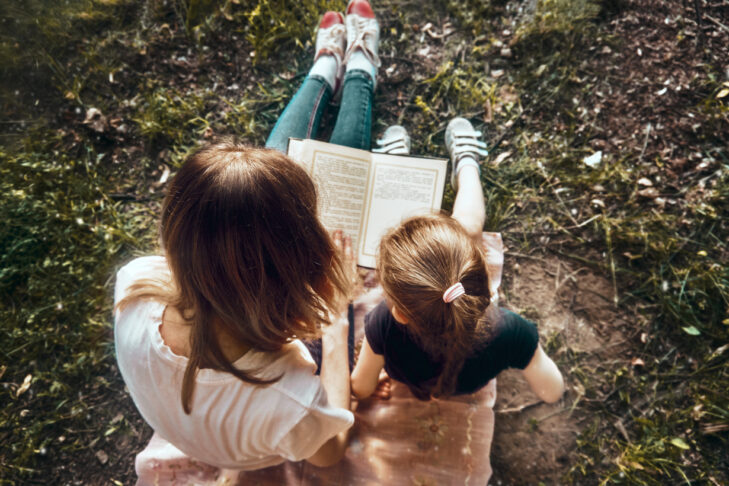Two years ago, almost to the day, my kids were sent home from school for what we were told would be two weeks. It seemed like it would be almost fun—a protracted snow day, where we could do kitchen experiments, bake bread, go on walks. The entire universe was given a mandatory timeout due to factors beyond our control. Even the toughest bosses had to throw up their hands and relinquish control.
Then the deaths began skyrocketing. The fear seeped in, and the chaos too. It became apparent that this wasn’t a two-week break. It was a completely structureless new way of life governed by an invisible, wildly infectious trickster.
Looking back, those early days seem like something from ancient history. Washing down groceries. Isolating the mail. Hanging on Dr. Fauci’s every syllable. I remember screaming at my preschooler for touching a tree and coating him in Purell. Danger, and fear, lurked everywhere.
This immediate vigilance gave way to a monotonous daily pattern of quiet desperation and halfhearted stabs at normalcy: Zoom calls, remote school, outdoor distanced meetings with friends that were sometimes uplifting and sometimes downright depressing, when we wondered how long it could all drag on. And then the brief reprieves: news of vaccines. A few weeks last summer where it seemed like the pandemic had ended—followed by more bad news, like breakthrough infections and even more transmissible variants.
Underpinning all this is the rubble, the detritus, of two years of enormous disruption on a scale we won’t begin to understand for years, ranging from loss of life to loss of learning to loss of jobs and livelihoods. Even those of us who are just going about our business, back to the soccer field or the grocery store, have invisible scars and carry a certain permanent vigilance. How can we ever feel truly safe again? How can we disengage from constant risk-calculus? I picture humanity as one big throng emerging from a movie theater (remember those?) into the light of day, squinting and shielding our eyes.
As a parent, mentally hardened by the past two years and helped along by my trusty low dose of Lexapro, I’ve begun to accept certain truisms that I never would have even contemplated in March 2020. They are:
We have no control over anything.
Really. I can protect myself and my family as best I can; I can do the right things and listen to the experts and take the proper steps to maneuver about this world sensibly, vaccinated and masked when needed—and, sometimes, it just won’t matter. Humans are not in the driver’s seat, and mastery over one’s fate is an illusion at best. This is true in all things, but COVID-19 made it painfully clear. You cannot outrun or out-strategize destiny.
Honesty is the best policy.
I’m pretty upfront about boundaries: I’m lucky that I’ve had bosses and colleagues where I could be candid about most anything, and I’m a pretty open person. That said: COVID gave people license to be honest about their limitations and fears in a way that seemed socially unacceptable before. If I don’t feel comfortable going to a crowded bar, I say so. If I’m tired and need to bow out of something, I say so. If I’m not ready for my kid to frolic at an indoor trampoline park with 50 other germy toddlers, I say so. The pandemic nudged us toward greater transparency with one another.
Kids have feelings too.
We often hear that kids are resilient—and I know this is true. They bounce back from a lot, and they adapt. That said, I often used to invalidate my fifth grader’s fears because, c’mon, how bad could life be? He had a cozy house, tons of toys, video games, friends, a full fridge and his very own guinea pig. Life was good. But he still had feelings, and in my rush to make him feel better by telling him about how lucky he was, I was undermining him. COVID made me take a step back and appreciate the enormity of his emotions. You can be lucky and sad at the same time, or safe yet worried. Now, instead of trying to talk him out of his worries, I ask him to explain them. (Usually, anyway. If he’s pouting about something senseless, like not being able to buy a new video game with his Greenlight card, I’m less sympathetic.)
Life is short.
My mom died during COVID (not of COVID, but the timing wasn’t ideal). Plenty of people died—too many. I spent a lot of time pre-COVID pursuing an agenda: work, success, money, perfection. Those things matter to me still. But I’m also not going to postpone fun in favor of productivity; it’s OK to have a good time without any sort of outcome or achievement attached, because we never know when it could be yanked away. I had a cold recently and actually took time to appreciate the fact that my old, tattered fleece blanket was within arm’s length. A blanket. Nothing fancy or grand. Just comforting and simple, one of the little things that makes life easier. Not everything is a headline moment or a triumph or a chore. That’s OK—in fact, that’s how it should be.
What has the pandemic taught you? I’m working on a series of stories about mental health, and I’ve already heard from so many of you. Leave a note in the comments or email me at kara@jewishboston.com.



